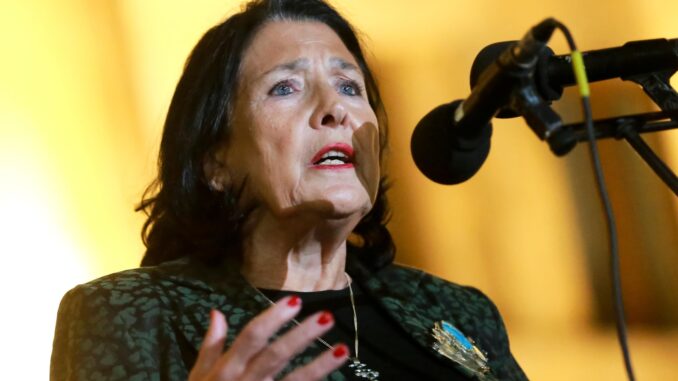
TBILISI, Georgia — Georgia’s ruling party, which has faced massive opposition protests demanding the annulment of its declared victory in the weekend parliamentary election amid allegations of vote rigging helped by Russia, is getting a boost with the visit from Hungary’s prime minister.
Victor Orbán, the first foreign leader to congratulate Georgian Dream, arrived on Monday in Georgia on a trip that highlighted his rifts within the European Union. The EU said he doesn’t have any mandate from the bloc for the visit.
Tens of thousands of Georgians rallied outside parliament on Monday night, demanding a new election under international supervision and a probe into the alleged vote rigging. The protest underlined tensions in the country which lies between Russia and Turkey and where the governing Georgian Dream party has become increasingly authoritarian and tilted toward Moscow.
President Salome Zourabichvili, who has rejected the official results, told The Associated Press that Georgia has fallen victim to Russian pressure against joining the EU. She said she hopes the United States and EU back the demonstrations.
“We’ve seen that Russian propaganda was directly used,” said Zourabichvili, a mostly ceremonial president and a fierce critic of Georgian Dream. She said the government has been “working hand-in-hand with Russia,” and “probably” received help from Moscow’s security services.
The Kremlin has rejected the accusations of interference. The U.S. and the EU have urged a full investigation into the result of Saturday’s vote.
The Central Election Commission said Georgian Dream received 54.8% of the vote, with almost all ballots counted. The party — established by Bidzina Ivanishvili, a shadowy billionaire who made his fortune in Russia — has adopted laws similar to those used by the Kremlin to crack down on freedom of speech and LGBTQ+ rights.
U.S. officials called on Georgia to repeal authoritarian legislation, address electoral deficiencies and move Georgia towards Europe.
Prime Minister Irakli Kobakhidze, a member of Georgian Dream, described his party’s success as “impressive and obvious,” and that “any attempts to talk about election manipulation … are doomed to failure.”
During Tuesday’s meeting with Orbán, Kobakhidze thanked him for his support of Georgia’s integration into the EU and noted that the two countries show values and approaches.
Orbán, in his turn, declared that the outcome of the vote meant that the Georgian people “voted for peace,” adding that “nobody wants to destroy his own country and bring it into a senseless war.”
Orbán’s comments appeared to echo some of the divisive Georgian Dream’s campaign rhetoric, in which the governing party accused the opposition of trying to destabilize the country and pointed at the war in Ukraine, alleging that the same fate may befall Georgia.
The Hungarian leader described the Georgian vote as free and democratic and rejected the opposition claim that Georgian Dream opposes integration into the EU as “really ridiculous.”
Orban, Russian President Vladimir Putin’s closest partner within the EU and Europe’s longest-serving leader, currently holds the rotating presidency of the EU, which often is the bloc’s global bullhorn and which Orban has used in ways that highlight internal divisions.
The EU suspended Georgia’s membership application process indefinitely because of a Russian-style “foreign influence law” passed in June. Many Georgians viewed Saturday’s vote as a pivotal referendum on the opportunity to join the EU.
The election campaign in the nation of 3.7 million people, which borders Russia, was marked by a bitter fight for votes and allegations of a smear campaign. European observers said the election took place in a “divisive” environment marked by intimidation and instances of vote-buying, double voting and physical violence.
During the campaign, Georgian Dream used “anti-Western and hostile rhetoric … promoted Russian misinformation, manipulations, and conspiracy theories,” said Antonio López-Istúriz White, head of the European Parliament monitoring delegation.
Election observers said instances of intimidation and other violations were particularly noticeable in rural areas.
Turnout in the vote was among the highest since Georgian Dream first won control of parliament in 2012.
The party has vowed to continue pushing toward EU accession but also wants to “reset” ties with Georgia’s former imperial master, Russia. In 2008, Georgia fought and lost a brief war with Moscow, which then recognized the independence of two breakaway Georgian regions and bolstered its military presence there.
___
Associated Press writer Sophiko Megrelidze in Tbilisi, Georgia, contributed to this report.


Be the first to comment